|
Mexico Swings Left
The recent Presidential elections in Mexico put Lopez Obrador
into the Presidency, the first left leaning President in
decades. It was a resounding victory, but what would this mean
for Mexico and its wealthy elite, who enjoyed benefits under the
prior administration. In Mexico, the rich 1% were in charge and
the 99% who were poor suffered, the income disparity tenacious.
During his campaign, Obrador made what might be considered
alarming statements, suggesting that the US should be virtually
invaded by immigrants and the drug cartels pardoned. But the
Zetas predict another outcome.
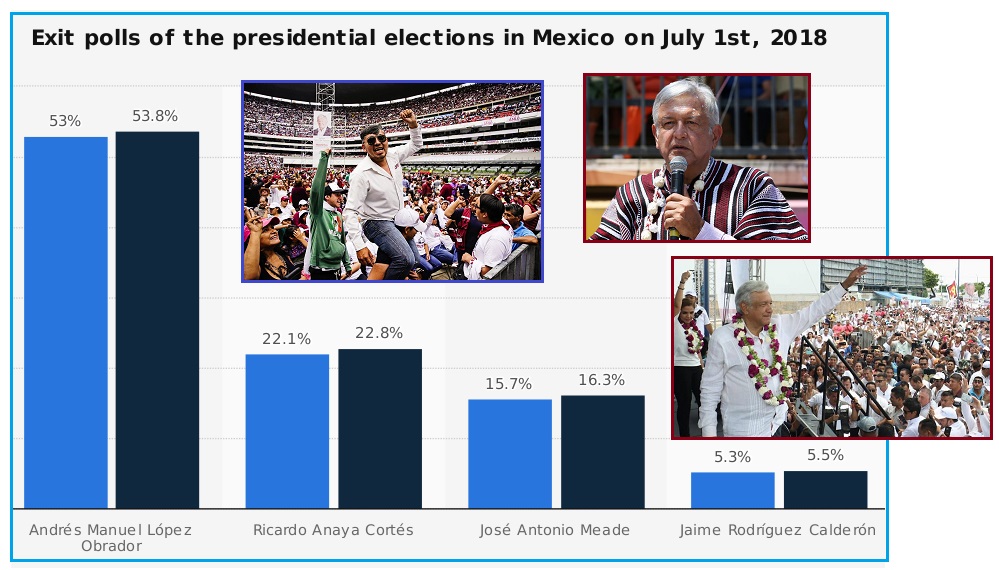
- Leftist Lopez Obrador claims
Landslide Victory in Mexican Presidential Elections
July 2, 2018
https://www.rt.com/newsline/431445-mexico-presidential-elections-obrador/
- Mexican ruling party candidate
Jose Antonio Meade has conceded defeat to his leftist,
anti-establishment opponent, after multiple exit polls
showed Andres Manuel Lopez Obrador winning by a two digit
margin. Obrador, 64, would be the first leftist president
in decades in Mexico and is expected to move the country
in a more nationalist direction, including reducing the
country's dependence on the United States.
- Mexican Lopez Obrador wins Historic
Election Landslide for Left
July 1, 2018
https://www.reuters.com/article/us-mexico-election/exit-polls-show
- Pledging to eradicate corruption
and subdue drug cartels with a less confrontational
approach, Lopez Obrador will carry high expectations into
office, while his efforts to reduce inequality will be
watched closely by nervous investors. His government could
usher in greater scrutiny of foreign investment and a less
accommodating approach to the United States.
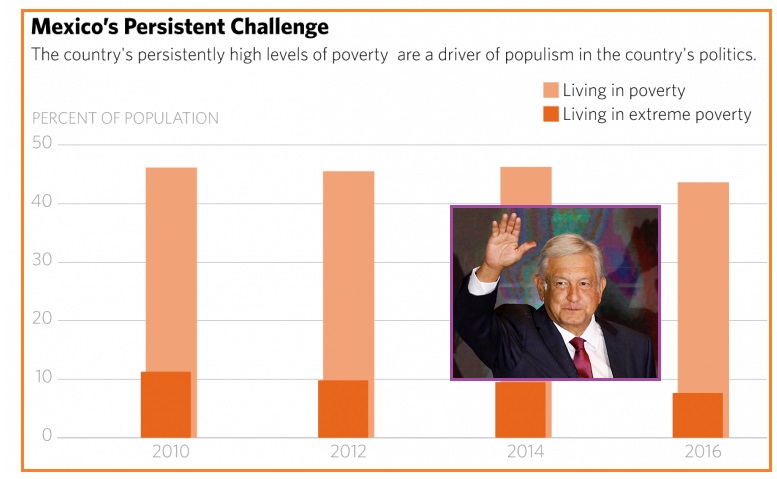
- Mexico’s Next President Tells
Country: They “must Leave their Towns and Find a Life in the
United States”
June 22, 2018
https://theconservativetreehouse.com/2018/06/22/mexicos-next-president
- AMLO has an economic plan where
hundreds-of-thousands of his fellow Mexicans flood the
Southern U.S. border region; overwhelm the system and
essentially create an initial border economy; then, with
the door and pathway created, begin a process of
exfiltration of U.S. economic wealth directly into Mexico.
- Mexican Presidential Candidate
World’s Asylum Seekers have a ‘Human Right’ to Migrate to US
June 22, 2018
http://dailycaller.com/2018/06/22/mexican-candidate-immigration-speech/
- Mexican presidential candidate
Andrés Manuel López Obrador (AMLO) declared mass
immigration to the United States a “human right” for all
North Americans. “And soon, very soon — after the victory
of our movement — we will defend all the migrants in the
American continent and all the migrants in the world,”
Obrador said, adding that immigrants “must leave their
towns and find a life in the United States.”
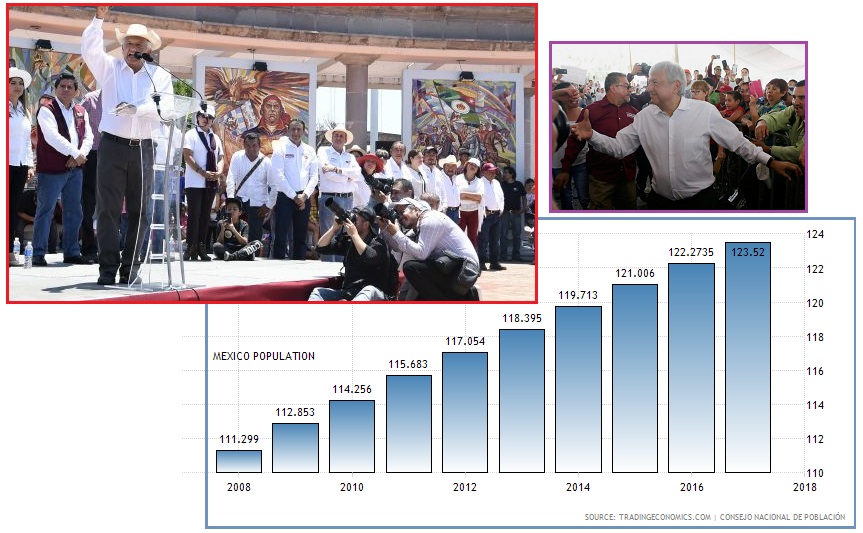
- AMLO Wins Big and All Eyes Turn to
Battle for Mexico's Congress
July 2, 2018
https://www.bloomberg.com/news/articles/2018-07-01/mexico-heads-to-polls
- Andres Manuel Lopez Obrador was
elected as Mexico’s first left-wing president in recent
times, riding a public revolt against rampant crime,
corruption and poverty and handing a crushing defeat to
the business-friendly parties who’ve run the country for
decades. Corruption was also a widespread complaint. Pena
Nieto’s allies and family were tainted by a string of
scandals. Looming over Mexico’s sea-change is the specter
of left-populist governments, from Brazil to Venezuela,
that ran their economies into the ground. Majorities in
the legislature would make it easier to advance an agenda
that includes building new refineries and railways, and
auditing energy contracts from Pena Nieto’s term.
ZetaTalk Prediction
7/31/2018: Being
able to encourage and sustain the local economy is key. Mexico
is not dominated by external corporate control, but the
disparity in income is onerous. Its primary problem is the
flourishing drug cartels, which port illegal drugs into the US
via the leaky border. Obrador’s predecessor Calderon
fought the drug cartels, where Obrador may take a different
approach. But in that Mexico exports heavily to the US, Trump
holds a sword over Mexico by threatening to revoke NAFTA trade
deals.
Campaign promises are most
often made to gain votes, so claims that Mexico will in
essence invade the US via immigration flow and that the drug
cartels will be pardoned should be viewed in that light. But
Trump is a deal maker, and a businessman, and could provide
development opportunities for Mexico unseen at present. The
people of Mexico are hard-working, and with a change in
management more amenable to challenging the control of the
existing wealthy elite, Mexico could bloom.
South America has increasingly turned left, electing leadership
that pushes out US corporate interests, nationalizing assets to
turn the profits over to the people. The PAIS alliance took over
Ecuador in 2007 when Correa was elected and has been in power
for over a decade with the 2017 election of Moreno continuing
the policies. The revolution in Cuba occurred in 1959, seizing
control of US corporate interests. Despite a US imposed embargo
that lasted until recently, Cuba has survived, providing free
healthcare and education to its peoples. The Zetas consider both
these countries to be successful leftist revolutions.
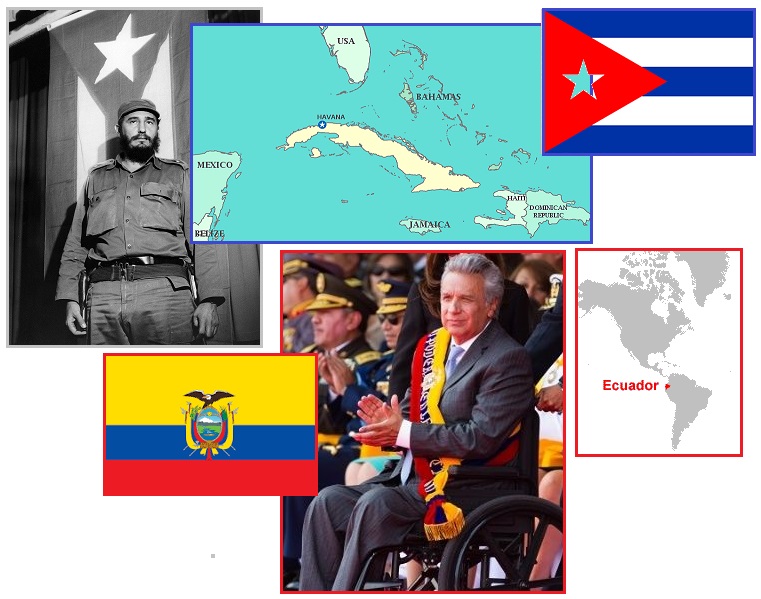
- PAIS Alliance
https://en.wikipedia.org/wiki/PAIS_Alliance
- PAIS is an Ecuadorian left-wing
social democratic political party.
- Nationalization of Oil Supplies
https://en.wikipedia.org/wiki/Nationalization_of_oil_supplies#Ecuador
- Ecuador has had one of the most
volatile oil policies in the region, partly a reflection
of the high political volatility in the country. In the
early 1990s annual foreign investment in oil was below US$
200 million, by the early 2000s it had surpassed US $1
billion. Changes in political power led to an increase in
government control over oil extraction. In particular, the
election of President Rafael Correa, on a
resource-nationalism platform, prompted increases in
government control and the approval of a windfall profits
tax.
- Economy of Cuba
https://en.wikipedia.org/wiki/Economy_of_Cuba
- Although Cuba belonged to the
high-income countries of Latin America since the 1870s,
income inequality was high, accompanied by capital
outflows to foreign investors. The country's economy had
grown rapidly in the early part of the century, fueled by
the sale of sugar to the United States. Its population was
characterized by chronic unemployment and deep poverty.
The banks and the country's entire financial system, all
electric power production and the majority of industry was
dominated by US companies. US monopolies owned 25 percent
of the best land in Cuba. More than 80 percent of farmland
was owned by sugar and livestock-raising large landowners.
On March 3, 1959, Fidel Castro seized control.
ZetaTalk Comment
7/31/2018: Moreno
was elected
President in Ecuador in 2017, continuing the leftist
regime. Moreno supports allowing Assange to live in the
Ecuador embassy in London, where the opposition said they
would end this practice. Ecuador also seized the US corporate
run oil companies and placed the oil profits in the hands of
the people. This was a successful revolution. Castro
provided Cuba with jobs and free medical care for decades,
disdaining capitalism for Communism. Despite attempts to
isolate and demonize Cuba, this revolution was a success.
Brazil’s fortunes turned around when it turned its back on IMF
debt slavery, refusing to pay the draconian interest rates and
instead joining BRICS. Brazil negotiated new terms for itself
with the IMF. Since then its economy has been stable and
successful. Per the Zetas, another successful leftist
revolution, turning its back on IMF and corporate control.
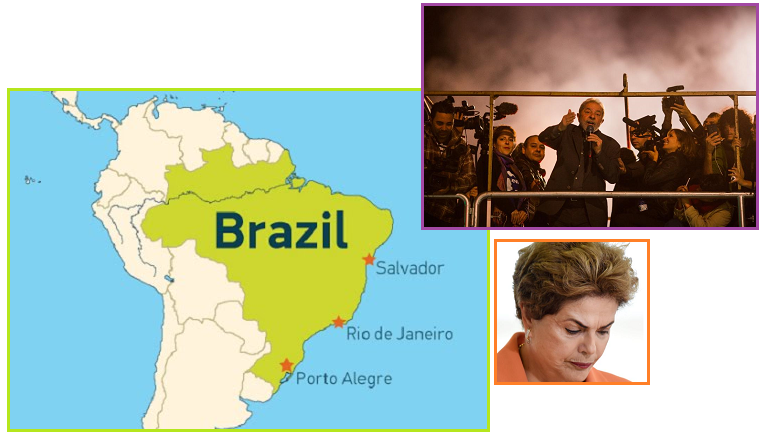
- The Mixed Fortunes of the BRICS
Countries, in 5 Facts
September 1, 2017
http://time.com/4923837/brics-summit-xiamen-mixed-fortunes/
- The BRICS countries—Brazil,
Russia, India, China and South Africa—will convene in the
Chinese city of Xiamen for their annual summit. Taken
together, these five countries cover 40 percent of the
world’s population and more than 25 percent of the world’s
land.
- Brazil's Political Left Ousted the
IMF, but New Leadership, may Need it Back
July 20, 2016
https://www.forbes.com/sites/kenrapoza/2016/07/20/brazils-political
- The left wing Workers' Party (PT)
rose to power thanks to the International Monetary Fund.
The public, sick of hearing about how the government had
to pay foreign lenders and didn't have the money to pay to
develop a poor economy, voted out the ruling elites and
voted in Luiz Inacio Lula da Silva, a union rabble rouser.
Lula kicked the International Monetary Fund to the curb
when Brazil paid the $15.5 billion it owed them in
December 2005. No longer was the government beholden to
the designs of the Fund's financial demands.
- Brazil: Government and History
http://www.scholastic.com/browse/subarticle.jsp?id=944
- From 1964 to 1985, the military
controlled the government under a succession of generals,
who suspended constitutional guarantees of rights.
Civilian government was restored in 1985. In order to
avert a disaster, the International Monetary Fund (IMF)
stepped in and gave $41.5 billion in emergency funds; in
1999 the government reduced the value of its currency. In
2001, Cardoso announced the launch of a $6 billion
anti-poverty program that included health and education
programs for the poor. But the economy worsened, and the
IMF had to grant further loans.
ZetaTalk Comment
7/31/2018: Brazil
has had leadership by the Worker’s
Party since 2010 and the economy does well and is
steady, the 8th largest in the world, despite President
Rousseff being impeached for corruption. Brazil is a member of
the BRICS banking network, likewise a success.
Venezuela Hell
And then there is Venezuela. Venezuela seemed well positioned
when the Chavez revolution occurred, as it had oil profits to
support its generous welfare system. But rather than save
Venezuela, it proved to be part of the downfall. When an OPEC
induced oil price war occurred in 2014, the funds ran short, and
the people began to riot. Venezuela became a Case
Study in what can happen when a society that has come to
rely upon cradle to grave welfare to take care of their every
need fails.
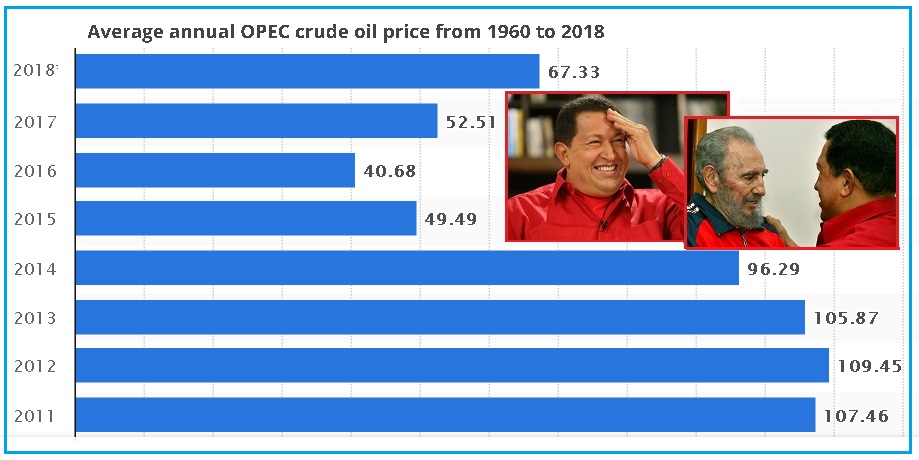
- Hugo Chávez
https://en.wikipedia.org/wiki/Hugo_Chavez
- Following the adoption of a new
constitution in 1999, Chávez focused on enacting social
reforms as part of the Bolivarian Revolution, which is a
type of socialist revolution. Using record-high oil
revenues of the 2000s, his government nationalized key
industries, created participatory democratic Communal
Councils, and implemented social programs known as the
Bolivarian Missions to expand access to food, housing,
healthcare, and education.
- How does the Price of Oil affect
Venezuela's Economy?
https://www.investopedia.com/ask/answers/032515/how-does-price-oil-affect
- While it maintains mostly an
inverse relationship with the U.S. economy, the price of
oil and Venezuela's economy move pretty much in lockstep.
When oil prices are high, Venezuela enjoys good economic
times. When oil prices drop, economic disaster ensues for
the South American country. Such was the case during the
second half of 2014, when a precipitous fall in oil prices
caused the bolivar currency system in Venezuela to crumble
and pushed the country to the verge of defaulting on its
considerable debt.
ZetaTalk Comment
7/31/2018: Under
the United
Socialist Party, Chavez initially sought to commandeer
oil profits in Venezuela, giving the profits to the people.
But Chavez was a poor manager and fled
the scene into a cancer death in 2013. Venezuela has
become a disaster.
If the loss of oil profits was part of the problem, the main
problem was that the people did not know how to grow and
distribute food or conduct any kind of industry. In a country
with many advantages - rich soil, plenty of rain, a temperate
climate, and not at war – the populace seemed without direction
or motivation except to riot and demand the old welfare system
be restored. Leadership was utterly missing, so Chavez and
Maduro began relying upon the military.
First to emerge was starvation.
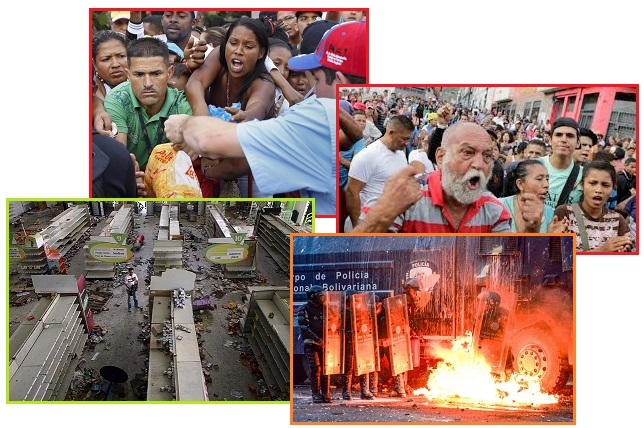
- "The Maduro Diet": A Photo Essay from
Venezuela
April 18, 2017
http://americasquarterly.org/content/maduro-diet-photo-essay-venezuela
- Shortages and a crumbling economy
have forced Venezuelans to change their eating habits;
many are losing weight and battling malnutrition. The
problem has its roots in 17 years of economic
mismanagement and the gradual deterioration of Venezuela's
means of producing, importing and distributing foodstuffs
and other necessities.
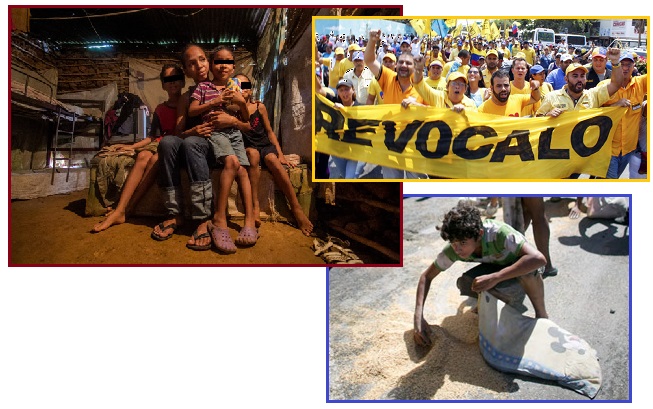
- Venezuelans Lost 19 lbs. on Average
over Past Year due to Lack of Food
February 20, 2017
http://www.foxnews.com/world/2017/02/20/study-venezuelans-lost-19-lb
- In a new sign that Venezuela’s
financial crisis is morphing dangerously into a
humanitarian one, a new nationwide survey shows that in
the past year nearly 75 percent of the population lost an
average of 19 pounds for lack of food. In all, 82 percent
of the nation's households live in poverty. Venezuelans
suffer shortages of the most basic goods, from food to
medicine, amid triple-digit inflation and a nearly 80
percent currency collapse in the last year.
Now Venezuela has developed run-away inflation and become a
banana republic. Their currency is worthless. Why aren’t the
citizens farming and fishing? Have they learned nothing from
Cuba, which is self-sufficient, or Ecuador right next door? Are
there no natural leaders in Venezuela that can overcome the
lethargy that being raised in a welfare state has engendered? Go
out in the fields! Garden! Free range the chickens! The barter
system has likely returned, per the Zetas, a positive move.
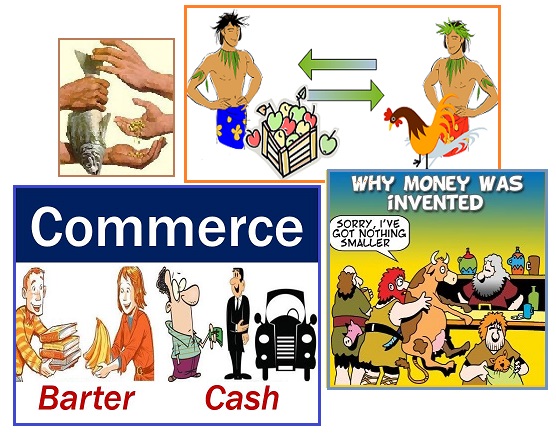
- A Minimum-Wage Worker in Venezuela
could afford 5 Cups of Coffee each Month — and Nothing Else
June 28, 2018
http://theweek.com/speedreads/781952/minimumwage-worker-venezuela
- Five million Venezuelan bolivars
is the equivalent of $1.45. It's also roughly a
minimum-wage worker's entire monthly salary in the South
American country. Thanks to stunning inflation, it now
takes 1 million bolivars to buy a cup of coffee in a
Venezuelan café. Additionally, if the pace of inflation
over the past three months continues, that inflation would
be 482,153 percent after a year.
ZetaTalk Prediction 12/15/2001: We
predict that long before the shift, a barter system will be
replacing the current paper money system. The value of the
dollar, in all countries, will be falling, such that in any
transaction one or both parties will feel they are getting a
fair deal only if a thing, not a representation, is given or
received. This is a common practice in countries where the
dollar is falling, and a natural migration as the thought
occurs readily to mankind, the barter system being recent in
their cultural evolution.
ZetaTalk Vision
7/15/1995: What
is money? A medium of exchange. Something of consistent value,
or at least stable value, which allows the barter system to
take place in a more abstract manner. However, the existence
of money, which has been called the root of all evil, supports
activities that give no value in and of themselves. Money is
replaced by communication and cooperation, and this works just
fine.
Self Sufficiency
Becoming self-sufficient does not require money or magic. It
requires a decision and persistence. It can be done by those
living in city slums, such as Growing
Power has shown. It can be done in back yards and along
crime ridden streets, as an LA hero
has shown. It can be done on a tiny plot of land, without the
need for fertilizers purchased at the store. It can, thus, be
done by anyone. Just get started on this, folks, before you find
yourself rioting for food and in a panic!
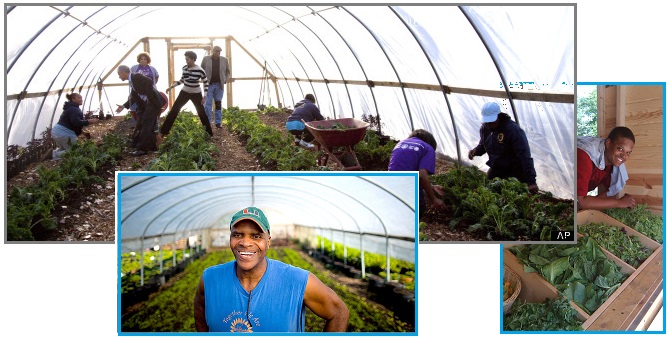
- An Urban Farmer Is Rewarded for His
Dream
September 25, 2008
http://www.nytimes.com/2008/10/01/dining/
- Growing Power organization has
six greenhouses and eight hoophouses for greens, herbs and
vegetables; pens for goats, ducks and turkeys; a chicken
coop and beehives; and a system for raising tilapia and
perch. There’s an advanced composting operation — a
virtual worm farm — and a lab that is working on ways to
turn food waste into fertilizer and methane gas for
energy. With a staff of about three dozen full-time
workers and 2,000 residents pitching in as volunteers, his
operation raises about $500,000 worth of affordable
produce, meat and fish. Using millions of pounds of food
waste, the farm produces endless compost piles, which are
then enriched by thousands of pounds of worms, essential
to producing the highest quality fertilizer in the world.
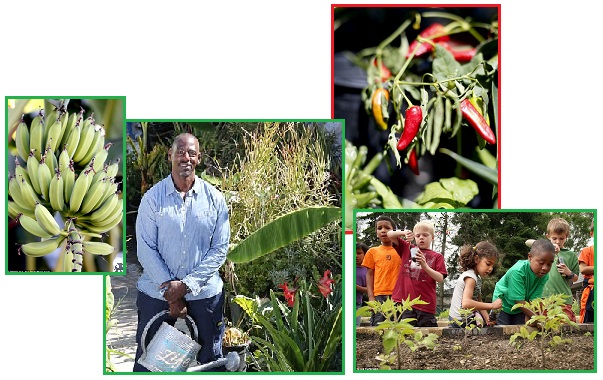
- The real OG (that's Organic Gardener)
of South Central LA
August 22, 2017
http://www.dailymail.co.uk/news/article-4812742/Ron-Finley-wants-end-food-slavery
- Ron Finley founded a group that
set about establishing community gardens across the city –
in homeless shelters, empty lots, and other parkways. He
began to build in the abandoned pool behind his home -
planting trees, fruits and vegetables that would later
become the thriving urban jungle for which he is best
known. Before long he had fresh pomegranates, lemons,
peppers, squash and carrots: a menagerie of practical
organic foods the neighborhood desperately needed, and
were open for the taking.
If you already live in an urban area, or in the suburbs, you
are a step ahead, but even someone crowded onto a high rise can
do container gardening. A family can get along on a mere acre of
land, and this includes space to graze livestock and free range
chickens. Even subsistence on Mother Nature is possible, as was
presented in Issue 364 of this
newsletter. A meat free diet need not lack protein. Duck weed is
high protein, and corn and amaranth combined have the lysine
equivalent of red meat! All your vitamin
needs can be supplied by bugs and weeds.
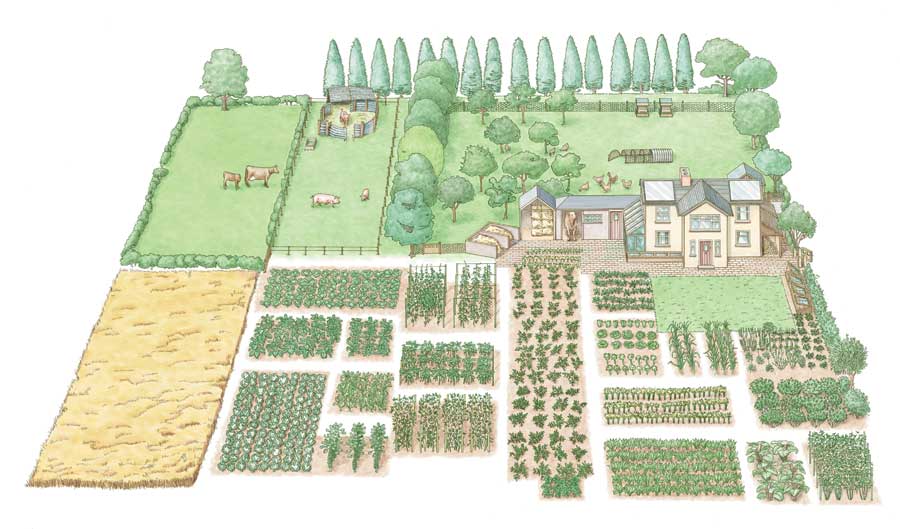
- Start a 1-Acre, Self-Sufficient
Homestead
August/September, 2011
https://www.motherearthnews.com/homesteading-and-livestock/self-reliance/
- In order to derive any sort of
living from that 1 acre without the application of a lot
of artificial fertilizer, it would have to be heavily
manured. Chickens for eggs, meat and pest control are the
top livestock choice on most homesteads.

ZetaTalk Prediction
12/15/1999: After
the cataclysms the snug blanket of protection that many have
taken for granted will be gone - no Social Security checks, no
home deliveries, no 911 emergency service, no free medical
services, and no welfare checks. In essence, humans will be
relying on one another, and not on an infrastructure.
|

